Well-being of Older People: A Sociological Perspective Report
VerifiedAdded on 2023/01/12
|8
|2556
|29
Report
AI Summary
This report delves into the multifaceted concept of well-being, specifically focusing on the experiences of older people in society. It begins by defining well-being and exploring its various dimensions, including physical, mental, social, and economic aspects. The main body of the report identifies key issues impacting the well-being of the elderly, such as physical health concerns, challenges related to retirement, the impact of living alone and social isolation, and the lack of adequate mental health services and housing quality. Furthermore, the report proposes strategies and recommendations for enhancing the well-being of older adults, including maintaining a healthy lifestyle, promoting social interaction, increasing healthcare access, encouraging volunteering, and supporting education and adult learning programs. The conclusion summarizes the importance of addressing these issues and implementing the proposed strategies to ensure a higher quality of life for older people. This report aims to provide a comprehensive overview of the challenges and opportunities related to the well-being of the elderly population.
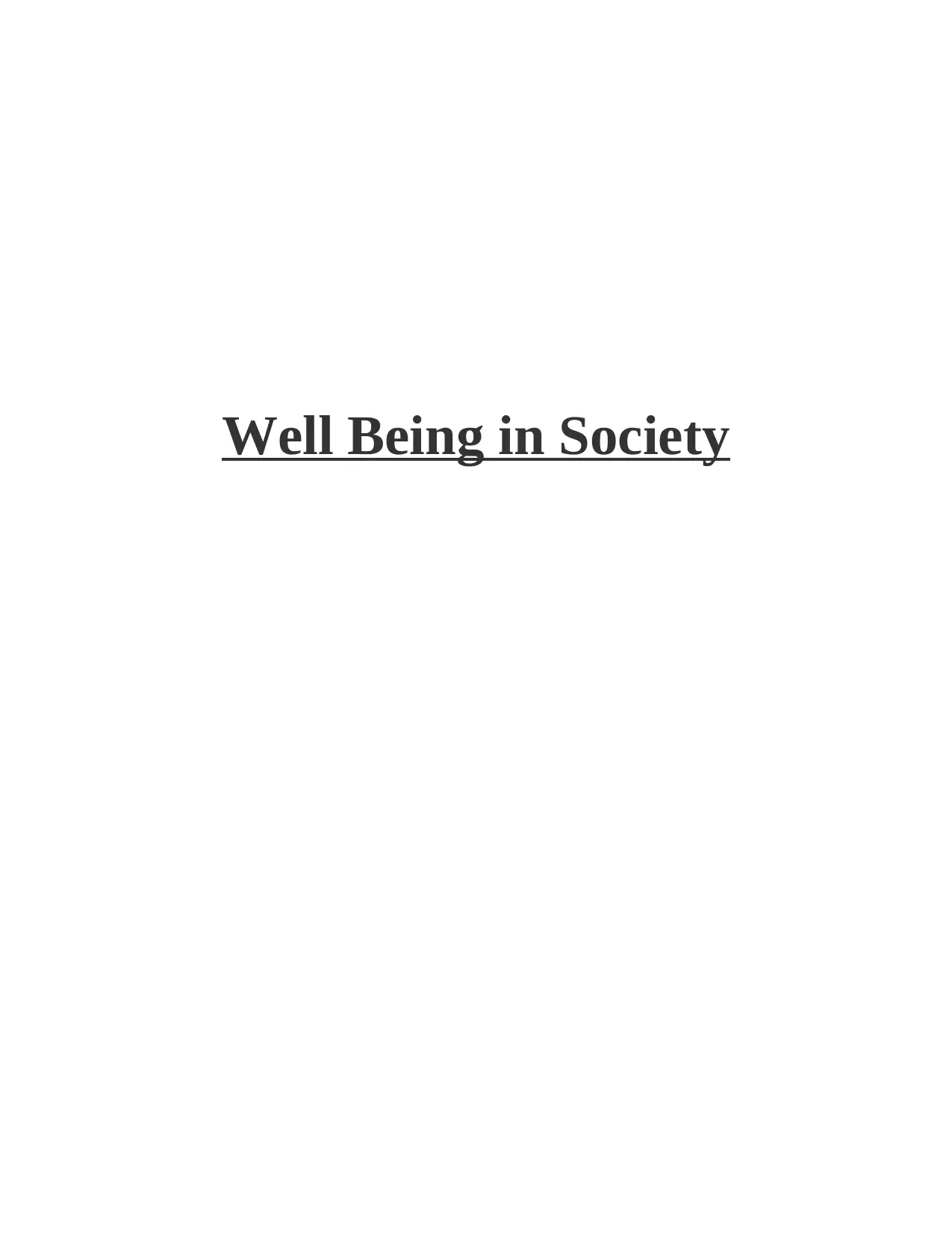
Well Being in Society
Paraphrase This Document
Need a fresh take? Get an instant paraphrase of this document with our AI Paraphraser
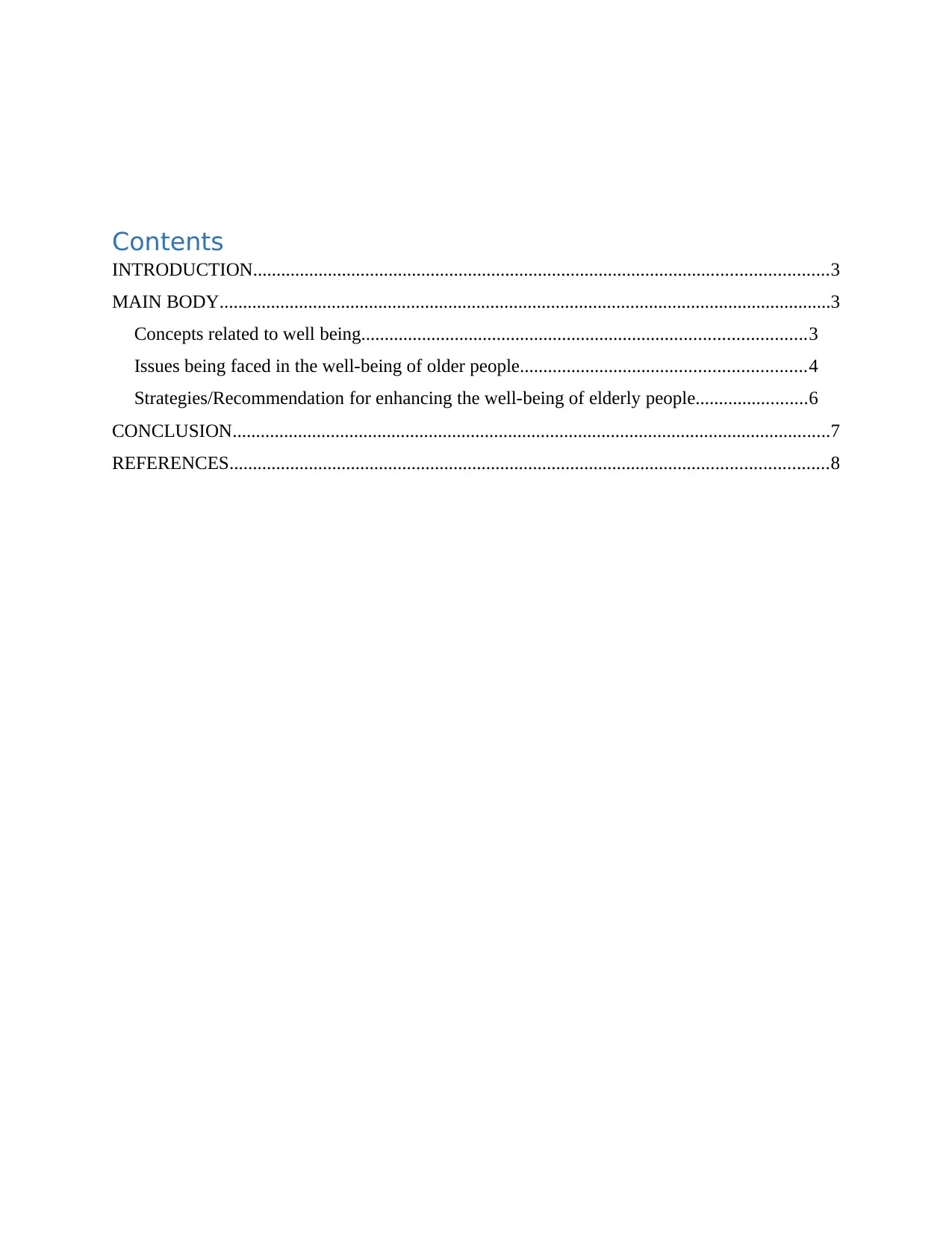
Contents
INTRODUCTION...........................................................................................................................3
MAIN BODY...................................................................................................................................3
Concepts related to well being...............................................................................................3
Issues being faced in the well-being of older people.............................................................4
Strategies/Recommendation for enhancing the well-being of elderly people........................6
CONCLUSION................................................................................................................................7
REFERENCES................................................................................................................................8
INTRODUCTION...........................................................................................................................3
MAIN BODY...................................................................................................................................3
Concepts related to well being...............................................................................................3
Issues being faced in the well-being of older people.............................................................4
Strategies/Recommendation for enhancing the well-being of elderly people........................6
CONCLUSION................................................................................................................................7
REFERENCES................................................................................................................................8
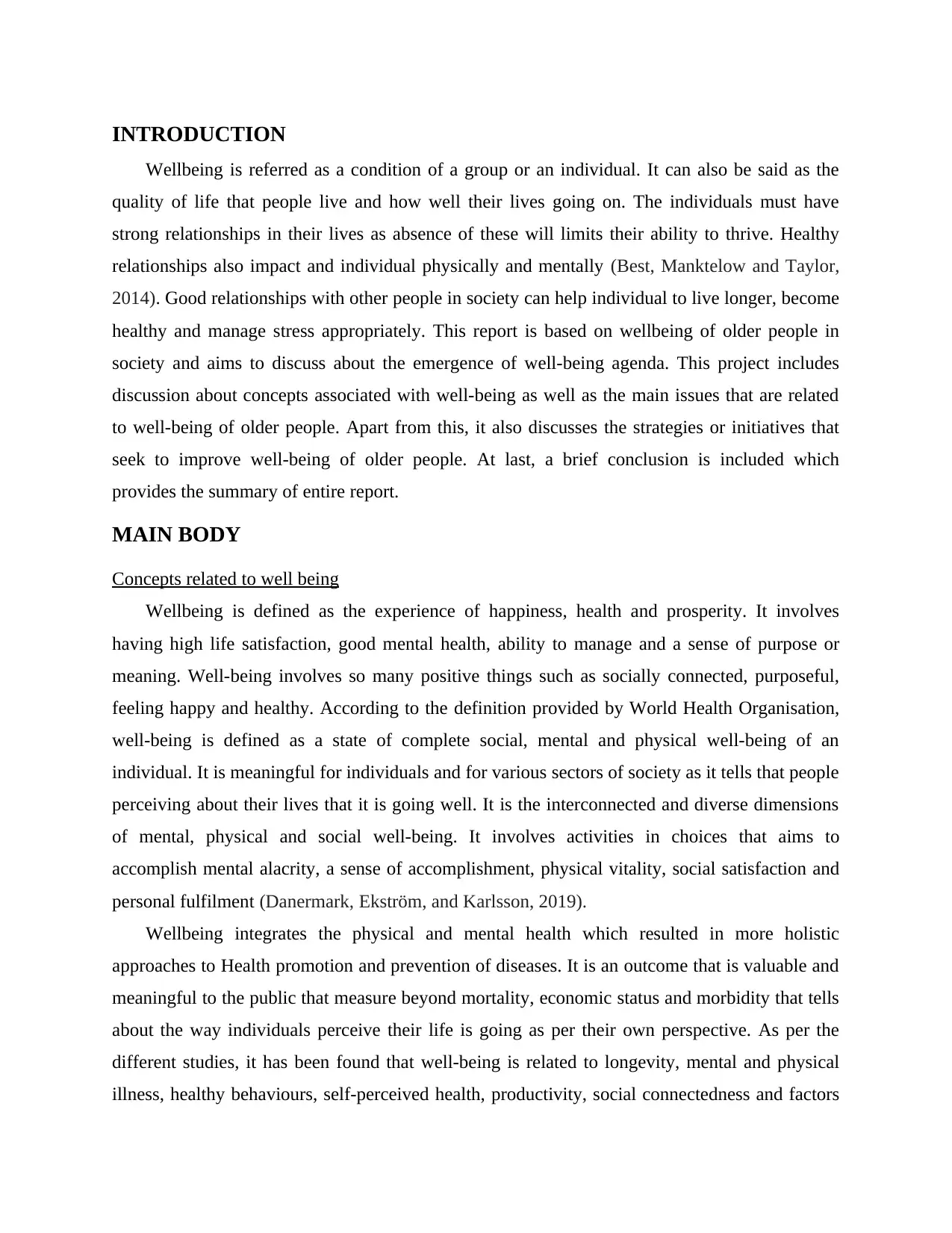
INTRODUCTION
Wellbeing is referred as a condition of a group or an individual. It can also be said as the
quality of life that people live and how well their lives going on. The individuals must have
strong relationships in their lives as absence of these will limits their ability to thrive. Healthy
relationships also impact and individual physically and mentally (Best, Manktelow and Taylor,
2014). Good relationships with other people in society can help individual to live longer, become
healthy and manage stress appropriately. This report is based on wellbeing of older people in
society and aims to discuss about the emergence of well-being agenda. This project includes
discussion about concepts associated with well-being as well as the main issues that are related
to well-being of older people. Apart from this, it also discusses the strategies or initiatives that
seek to improve well-being of older people. At last, a brief conclusion is included which
provides the summary of entire report.
MAIN BODY
Concepts related to well being
Wellbeing is defined as the experience of happiness, health and prosperity. It involves
having high life satisfaction, good mental health, ability to manage and a sense of purpose or
meaning. Well-being involves so many positive things such as socially connected, purposeful,
feeling happy and healthy. According to the definition provided by World Health Organisation,
well-being is defined as a state of complete social, mental and physical well-being of an
individual. It is meaningful for individuals and for various sectors of society as it tells that people
perceiving about their lives that it is going well. It is the interconnected and diverse dimensions
of mental, physical and social well-being. It involves activities in choices that aims to
accomplish mental alacrity, a sense of accomplishment, physical vitality, social satisfaction and
personal fulfilment (Danermark, Ekström, and Karlsson, 2019).
Wellbeing integrates the physical and mental health which resulted in more holistic
approaches to Health promotion and prevention of diseases. It is an outcome that is valuable and
meaningful to the public that measure beyond mortality, economic status and morbidity that tells
about the way individuals perceive their life is going as per their own perspective. As per the
different studies, it has been found that well-being is related to longevity, mental and physical
illness, healthy behaviours, self-perceived health, productivity, social connectedness and factors
Wellbeing is referred as a condition of a group or an individual. It can also be said as the
quality of life that people live and how well their lives going on. The individuals must have
strong relationships in their lives as absence of these will limits their ability to thrive. Healthy
relationships also impact and individual physically and mentally (Best, Manktelow and Taylor,
2014). Good relationships with other people in society can help individual to live longer, become
healthy and manage stress appropriately. This report is based on wellbeing of older people in
society and aims to discuss about the emergence of well-being agenda. This project includes
discussion about concepts associated with well-being as well as the main issues that are related
to well-being of older people. Apart from this, it also discusses the strategies or initiatives that
seek to improve well-being of older people. At last, a brief conclusion is included which
provides the summary of entire report.
MAIN BODY
Concepts related to well being
Wellbeing is defined as the experience of happiness, health and prosperity. It involves
having high life satisfaction, good mental health, ability to manage and a sense of purpose or
meaning. Well-being involves so many positive things such as socially connected, purposeful,
feeling happy and healthy. According to the definition provided by World Health Organisation,
well-being is defined as a state of complete social, mental and physical well-being of an
individual. It is meaningful for individuals and for various sectors of society as it tells that people
perceiving about their lives that it is going well. It is the interconnected and diverse dimensions
of mental, physical and social well-being. It involves activities in choices that aims to
accomplish mental alacrity, a sense of accomplishment, physical vitality, social satisfaction and
personal fulfilment (Danermark, Ekström, and Karlsson, 2019).
Wellbeing integrates the physical and mental health which resulted in more holistic
approaches to Health promotion and prevention of diseases. It is an outcome that is valuable and
meaningful to the public that measure beyond mortality, economic status and morbidity that tells
about the way individuals perceive their life is going as per their own perspective. As per the
different studies, it has been found that well-being is related to longevity, mental and physical
illness, healthy behaviours, self-perceived health, productivity, social connectedness and factors
⊘ This is a preview!⊘
Do you want full access?
Subscribe today to unlock all pages.

Trusted by 1+ million students worldwide
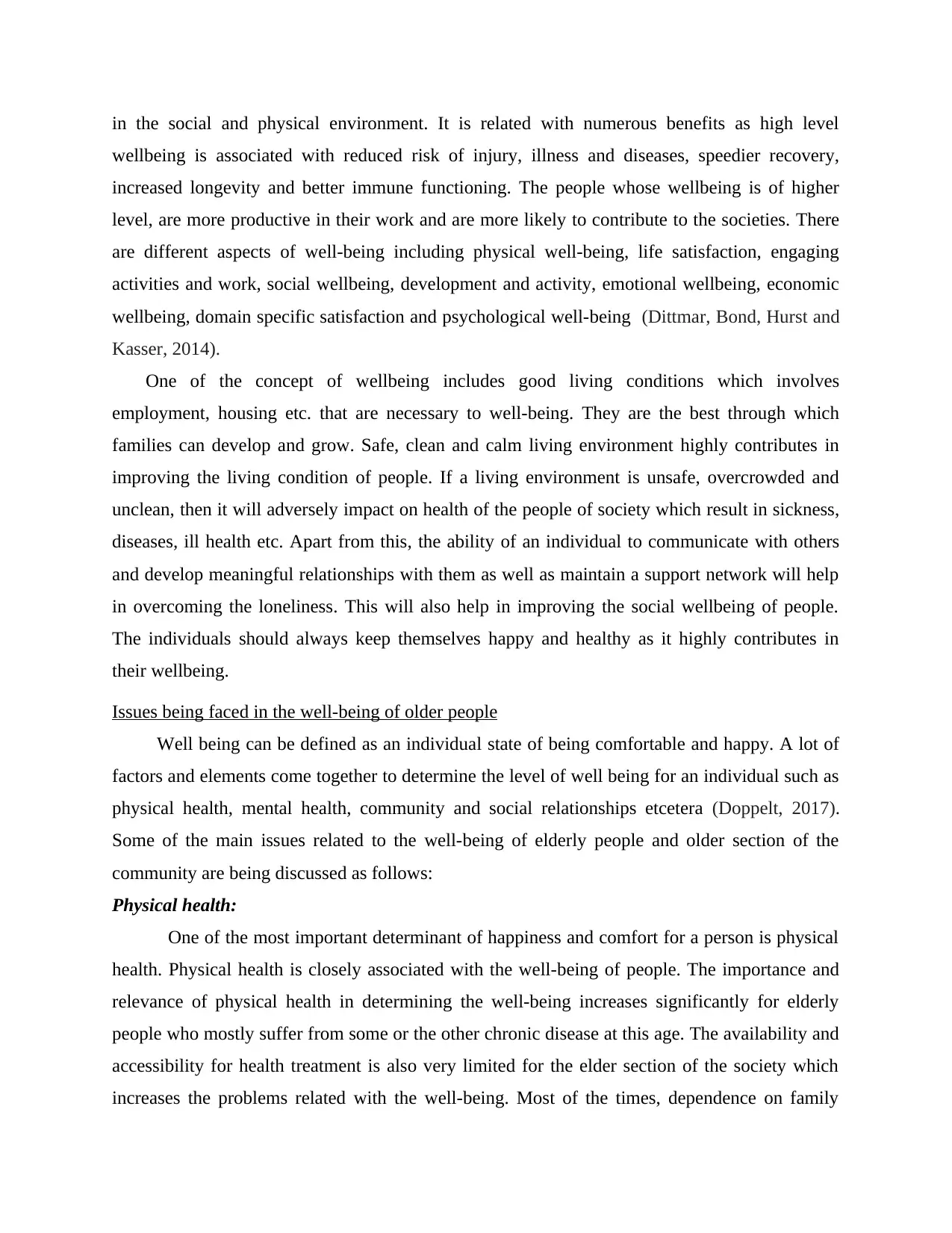
in the social and physical environment. It is related with numerous benefits as high level
wellbeing is associated with reduced risk of injury, illness and diseases, speedier recovery,
increased longevity and better immune functioning. The people whose wellbeing is of higher
level, are more productive in their work and are more likely to contribute to the societies. There
are different aspects of well-being including physical well-being, life satisfaction, engaging
activities and work, social wellbeing, development and activity, emotional wellbeing, economic
wellbeing, domain specific satisfaction and psychological well-being (Dittmar, Bond, Hurst and
Kasser, 2014).
One of the concept of wellbeing includes good living conditions which involves
employment, housing etc. that are necessary to well-being. They are the best through which
families can develop and grow. Safe, clean and calm living environment highly contributes in
improving the living condition of people. If a living environment is unsafe, overcrowded and
unclean, then it will adversely impact on health of the people of society which result in sickness,
diseases, ill health etc. Apart from this, the ability of an individual to communicate with others
and develop meaningful relationships with them as well as maintain a support network will help
in overcoming the loneliness. This will also help in improving the social wellbeing of people.
The individuals should always keep themselves happy and healthy as it highly contributes in
their wellbeing.
Issues being faced in the well-being of older people
Well being can be defined as an individual state of being comfortable and happy. A lot of
factors and elements come together to determine the level of well being for an individual such as
physical health, mental health, community and social relationships etcetera (Doppelt, 2017).
Some of the main issues related to the well-being of elderly people and older section of the
community are being discussed as follows:
Physical health:
One of the most important determinant of happiness and comfort for a person is physical
health. Physical health is closely associated with the well-being of people. The importance and
relevance of physical health in determining the well-being increases significantly for elderly
people who mostly suffer from some or the other chronic disease at this age. The availability and
accessibility for health treatment is also very limited for the elder section of the society which
increases the problems related with the well-being. Most of the times, dependence on family
wellbeing is associated with reduced risk of injury, illness and diseases, speedier recovery,
increased longevity and better immune functioning. The people whose wellbeing is of higher
level, are more productive in their work and are more likely to contribute to the societies. There
are different aspects of well-being including physical well-being, life satisfaction, engaging
activities and work, social wellbeing, development and activity, emotional wellbeing, economic
wellbeing, domain specific satisfaction and psychological well-being (Dittmar, Bond, Hurst and
Kasser, 2014).
One of the concept of wellbeing includes good living conditions which involves
employment, housing etc. that are necessary to well-being. They are the best through which
families can develop and grow. Safe, clean and calm living environment highly contributes in
improving the living condition of people. If a living environment is unsafe, overcrowded and
unclean, then it will adversely impact on health of the people of society which result in sickness,
diseases, ill health etc. Apart from this, the ability of an individual to communicate with others
and develop meaningful relationships with them as well as maintain a support network will help
in overcoming the loneliness. This will also help in improving the social wellbeing of people.
The individuals should always keep themselves happy and healthy as it highly contributes in
their wellbeing.
Issues being faced in the well-being of older people
Well being can be defined as an individual state of being comfortable and happy. A lot of
factors and elements come together to determine the level of well being for an individual such as
physical health, mental health, community and social relationships etcetera (Doppelt, 2017).
Some of the main issues related to the well-being of elderly people and older section of the
community are being discussed as follows:
Physical health:
One of the most important determinant of happiness and comfort for a person is physical
health. Physical health is closely associated with the well-being of people. The importance and
relevance of physical health in determining the well-being increases significantly for elderly
people who mostly suffer from some or the other chronic disease at this age. The availability and
accessibility for health treatment is also very limited for the elder section of the society which
increases the problems related with the well-being. Most of the times, dependence on family
Paraphrase This Document
Need a fresh take? Get an instant paraphrase of this document with our AI Paraphraser
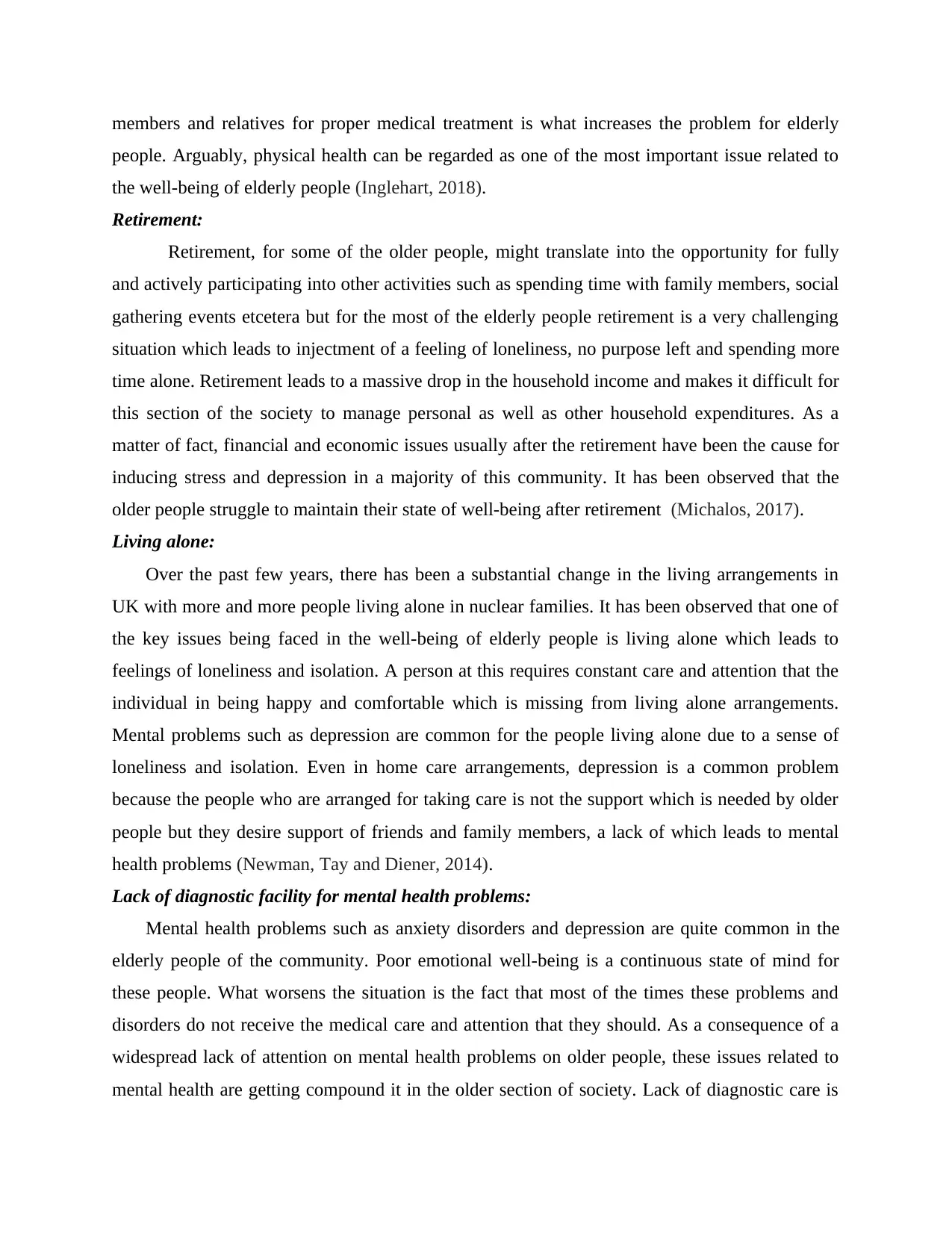
members and relatives for proper medical treatment is what increases the problem for elderly
people. Arguably, physical health can be regarded as one of the most important issue related to
the well-being of elderly people (Inglehart, 2018).
Retirement:
Retirement, for some of the older people, might translate into the opportunity for fully
and actively participating into other activities such as spending time with family members, social
gathering events etcetera but for the most of the elderly people retirement is a very challenging
situation which leads to injectment of a feeling of loneliness, no purpose left and spending more
time alone. Retirement leads to a massive drop in the household income and makes it difficult for
this section of the society to manage personal as well as other household expenditures. As a
matter of fact, financial and economic issues usually after the retirement have been the cause for
inducing stress and depression in a majority of this community. It has been observed that the
older people struggle to maintain their state of well-being after retirement (Michalos, 2017).
Living alone:
Over the past few years, there has been a substantial change in the living arrangements in
UK with more and more people living alone in nuclear families. It has been observed that one of
the key issues being faced in the well-being of elderly people is living alone which leads to
feelings of loneliness and isolation. A person at this requires constant care and attention that the
individual in being happy and comfortable which is missing from living alone arrangements.
Mental problems such as depression are common for the people living alone due to a sense of
loneliness and isolation. Even in home care arrangements, depression is a common problem
because the people who are arranged for taking care is not the support which is needed by older
people but they desire support of friends and family members, a lack of which leads to mental
health problems (Newman, Tay and Diener, 2014).
Lack of diagnostic facility for mental health problems:
Mental health problems such as anxiety disorders and depression are quite common in the
elderly people of the community. Poor emotional well-being is a continuous state of mind for
these people. What worsens the situation is the fact that most of the times these problems and
disorders do not receive the medical care and attention that they should. As a consequence of a
widespread lack of attention on mental health problems on older people, these issues related to
mental health are getting compound it in the older section of society. Lack of diagnostic care is
people. Arguably, physical health can be regarded as one of the most important issue related to
the well-being of elderly people (Inglehart, 2018).
Retirement:
Retirement, for some of the older people, might translate into the opportunity for fully
and actively participating into other activities such as spending time with family members, social
gathering events etcetera but for the most of the elderly people retirement is a very challenging
situation which leads to injectment of a feeling of loneliness, no purpose left and spending more
time alone. Retirement leads to a massive drop in the household income and makes it difficult for
this section of the society to manage personal as well as other household expenditures. As a
matter of fact, financial and economic issues usually after the retirement have been the cause for
inducing stress and depression in a majority of this community. It has been observed that the
older people struggle to maintain their state of well-being after retirement (Michalos, 2017).
Living alone:
Over the past few years, there has been a substantial change in the living arrangements in
UK with more and more people living alone in nuclear families. It has been observed that one of
the key issues being faced in the well-being of elderly people is living alone which leads to
feelings of loneliness and isolation. A person at this requires constant care and attention that the
individual in being happy and comfortable which is missing from living alone arrangements.
Mental problems such as depression are common for the people living alone due to a sense of
loneliness and isolation. Even in home care arrangements, depression is a common problem
because the people who are arranged for taking care is not the support which is needed by older
people but they desire support of friends and family members, a lack of which leads to mental
health problems (Newman, Tay and Diener, 2014).
Lack of diagnostic facility for mental health problems:
Mental health problems such as anxiety disorders and depression are quite common in the
elderly people of the community. Poor emotional well-being is a continuous state of mind for
these people. What worsens the situation is the fact that most of the times these problems and
disorders do not receive the medical care and attention that they should. As a consequence of a
widespread lack of attention on mental health problems on older people, these issues related to
mental health are getting compound it in the older section of society. Lack of diagnostic care is
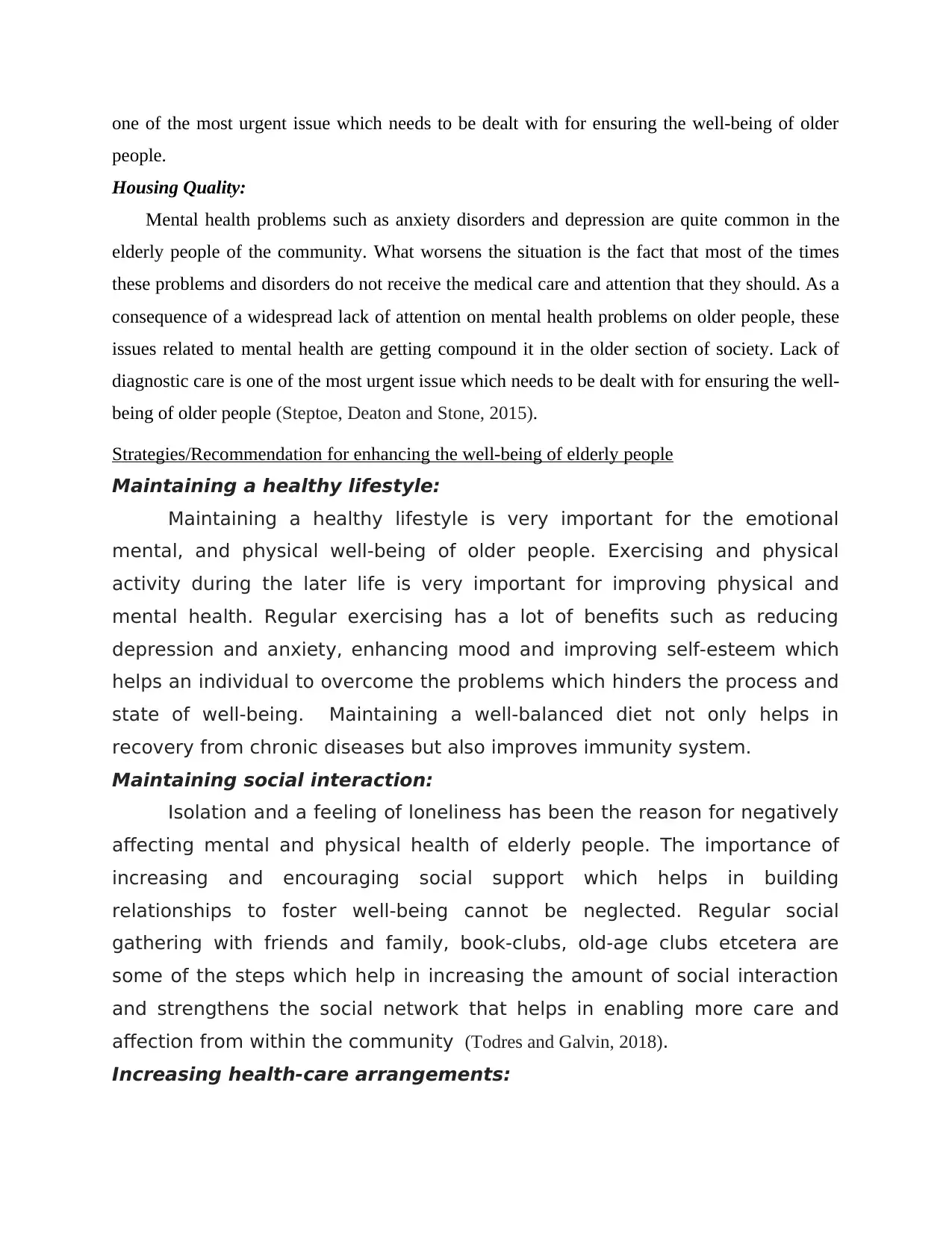
one of the most urgent issue which needs to be dealt with for ensuring the well-being of older
people.
Housing Quality:
Mental health problems such as anxiety disorders and depression are quite common in the
elderly people of the community. What worsens the situation is the fact that most of the times
these problems and disorders do not receive the medical care and attention that they should. As a
consequence of a widespread lack of attention on mental health problems on older people, these
issues related to mental health are getting compound it in the older section of society. Lack of
diagnostic care is one of the most urgent issue which needs to be dealt with for ensuring the well-
being of older people (Steptoe, Deaton and Stone, 2015).
Strategies/Recommendation for enhancing the well-being of elderly people
Maintaining a healthy lifestyle:
Maintaining a healthy lifestyle is very important for the emotional
mental, and physical well-being of older people. Exercising and physical
activity during the later life is very important for improving physical and
mental health. Regular exercising has a lot of benefits such as reducing
depression and anxiety, enhancing mood and improving self-esteem which
helps an individual to overcome the problems which hinders the process and
state of well-being. Maintaining a well-balanced diet not only helps in
recovery from chronic diseases but also improves immunity system.
Maintaining social interaction:
Isolation and a feeling of loneliness has been the reason for negatively
affecting mental and physical health of elderly people. The importance of
increasing and encouraging social support which helps in building
relationships to foster well-being cannot be neglected. Regular social
gathering with friends and family, book-clubs, old-age clubs etcetera are
some of the steps which help in increasing the amount of social interaction
and strengthens the social network that helps in enabling more care and
affection from within the community (Todres and Galvin, 2018).
Increasing health-care arrangements:
people.
Housing Quality:
Mental health problems such as anxiety disorders and depression are quite common in the
elderly people of the community. What worsens the situation is the fact that most of the times
these problems and disorders do not receive the medical care and attention that they should. As a
consequence of a widespread lack of attention on mental health problems on older people, these
issues related to mental health are getting compound it in the older section of society. Lack of
diagnostic care is one of the most urgent issue which needs to be dealt with for ensuring the well-
being of older people (Steptoe, Deaton and Stone, 2015).
Strategies/Recommendation for enhancing the well-being of elderly people
Maintaining a healthy lifestyle:
Maintaining a healthy lifestyle is very important for the emotional
mental, and physical well-being of older people. Exercising and physical
activity during the later life is very important for improving physical and
mental health. Regular exercising has a lot of benefits such as reducing
depression and anxiety, enhancing mood and improving self-esteem which
helps an individual to overcome the problems which hinders the process and
state of well-being. Maintaining a well-balanced diet not only helps in
recovery from chronic diseases but also improves immunity system.
Maintaining social interaction:
Isolation and a feeling of loneliness has been the reason for negatively
affecting mental and physical health of elderly people. The importance of
increasing and encouraging social support which helps in building
relationships to foster well-being cannot be neglected. Regular social
gathering with friends and family, book-clubs, old-age clubs etcetera are
some of the steps which help in increasing the amount of social interaction
and strengthens the social network that helps in enabling more care and
affection from within the community (Todres and Galvin, 2018).
Increasing health-care arrangements:
⊘ This is a preview!⊘
Do you want full access?
Subscribe today to unlock all pages.

Trusted by 1+ million students worldwide
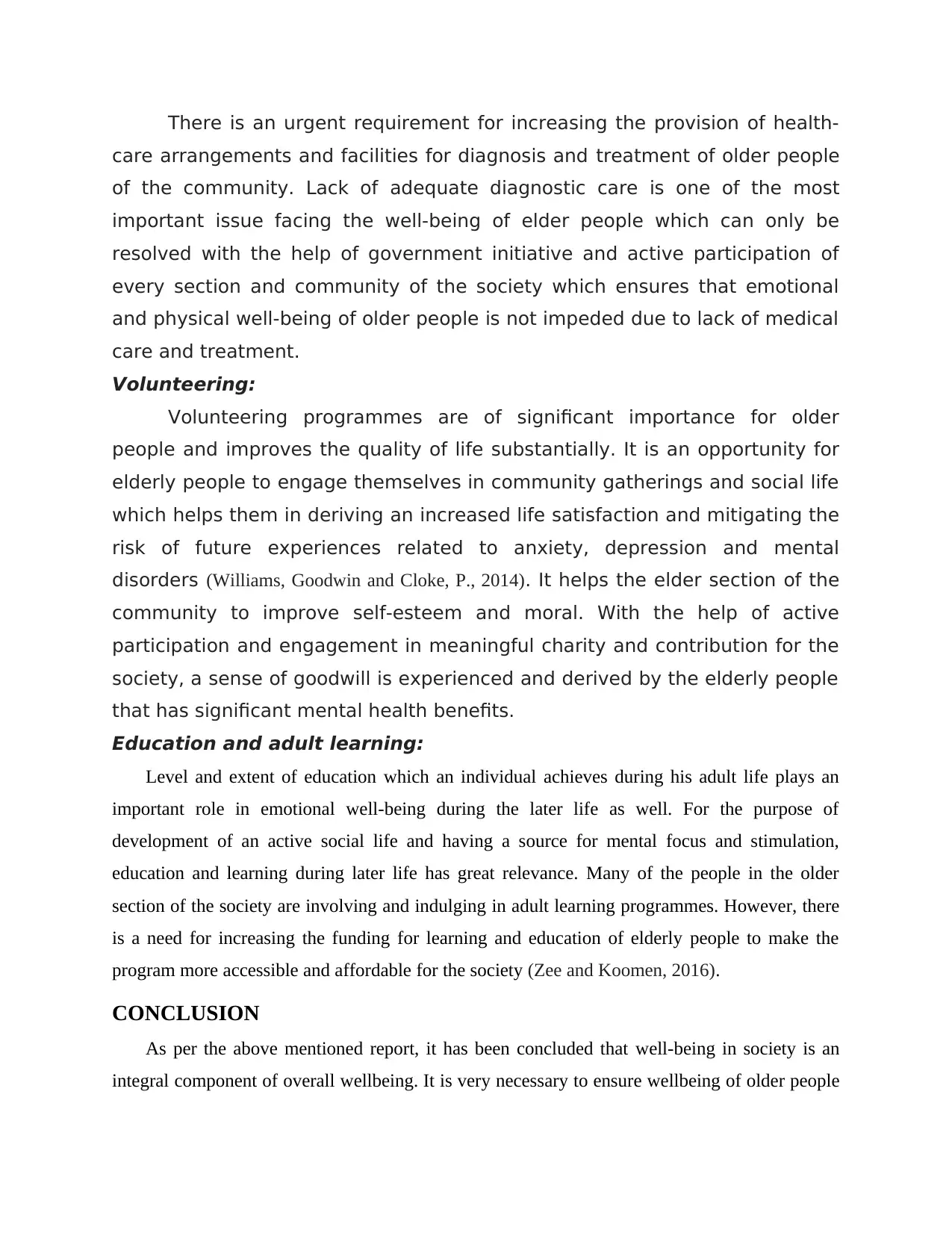
There is an urgent requirement for increasing the provision of health-
care arrangements and facilities for diagnosis and treatment of older people
of the community. Lack of adequate diagnostic care is one of the most
important issue facing the well-being of elder people which can only be
resolved with the help of government initiative and active participation of
every section and community of the society which ensures that emotional
and physical well-being of older people is not impeded due to lack of medical
care and treatment.
Volunteering:
Volunteering programmes are of significant importance for older
people and improves the quality of life substantially. It is an opportunity for
elderly people to engage themselves in community gatherings and social life
which helps them in deriving an increased life satisfaction and mitigating the
risk of future experiences related to anxiety, depression and mental
disorders (Williams, Goodwin and Cloke, P., 2014). It helps the elder section of the
community to improve self-esteem and moral. With the help of active
participation and engagement in meaningful charity and contribution for the
society, a sense of goodwill is experienced and derived by the elderly people
that has significant mental health benefits.
Education and adult learning:
Level and extent of education which an individual achieves during his adult life plays an
important role in emotional well-being during the later life as well. For the purpose of
development of an active social life and having a source for mental focus and stimulation,
education and learning during later life has great relevance. Many of the people in the older
section of the society are involving and indulging in adult learning programmes. However, there
is a need for increasing the funding for learning and education of elderly people to make the
program more accessible and affordable for the society (Zee and Koomen, 2016).
CONCLUSION
As per the above mentioned report, it has been concluded that well-being in society is an
integral component of overall wellbeing. It is very necessary to ensure wellbeing of older people
care arrangements and facilities for diagnosis and treatment of older people
of the community. Lack of adequate diagnostic care is one of the most
important issue facing the well-being of elder people which can only be
resolved with the help of government initiative and active participation of
every section and community of the society which ensures that emotional
and physical well-being of older people is not impeded due to lack of medical
care and treatment.
Volunteering:
Volunteering programmes are of significant importance for older
people and improves the quality of life substantially. It is an opportunity for
elderly people to engage themselves in community gatherings and social life
which helps them in deriving an increased life satisfaction and mitigating the
risk of future experiences related to anxiety, depression and mental
disorders (Williams, Goodwin and Cloke, P., 2014). It helps the elder section of the
community to improve self-esteem and moral. With the help of active
participation and engagement in meaningful charity and contribution for the
society, a sense of goodwill is experienced and derived by the elderly people
that has significant mental health benefits.
Education and adult learning:
Level and extent of education which an individual achieves during his adult life plays an
important role in emotional well-being during the later life as well. For the purpose of
development of an active social life and having a source for mental focus and stimulation,
education and learning during later life has great relevance. Many of the people in the older
section of the society are involving and indulging in adult learning programmes. However, there
is a need for increasing the funding for learning and education of elderly people to make the
program more accessible and affordable for the society (Zee and Koomen, 2016).
CONCLUSION
As per the above mentioned report, it has been concluded that well-being in society is an
integral component of overall wellbeing. It is very necessary to ensure wellbeing of older people
Paraphrase This Document
Need a fresh take? Get an instant paraphrase of this document with our AI Paraphraser
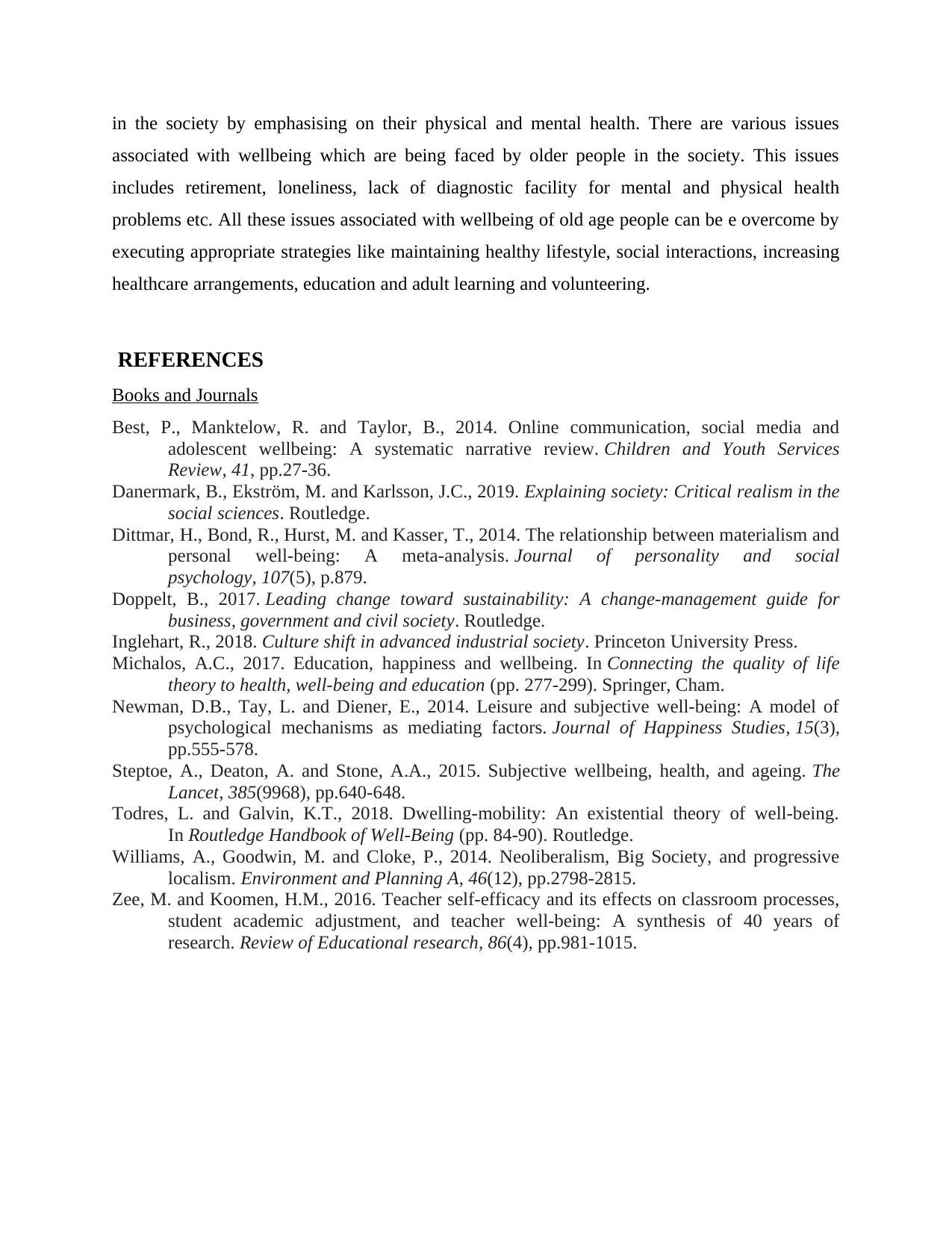
in the society by emphasising on their physical and mental health. There are various issues
associated with wellbeing which are being faced by older people in the society. This issues
includes retirement, loneliness, lack of diagnostic facility for mental and physical health
problems etc. All these issues associated with wellbeing of old age people can be e overcome by
executing appropriate strategies like maintaining healthy lifestyle, social interactions, increasing
healthcare arrangements, education and adult learning and volunteering.
REFERENCES
Books and Journals
Best, P., Manktelow, R. and Taylor, B., 2014. Online communication, social media and
adolescent wellbeing: A systematic narrative review. Children and Youth Services
Review, 41, pp.27-36.
Danermark, B., Ekström, M. and Karlsson, J.C., 2019. Explaining society: Critical realism in the
social sciences. Routledge.
Dittmar, H., Bond, R., Hurst, M. and Kasser, T., 2014. The relationship between materialism and
personal well-being: A meta-analysis. Journal of personality and social
psychology, 107(5), p.879.
Doppelt, B., 2017. Leading change toward sustainability: A change-management guide for
business, government and civil society. Routledge.
Inglehart, R., 2018. Culture shift in advanced industrial society. Princeton University Press.
Michalos, A.C., 2017. Education, happiness and wellbeing. In Connecting the quality of life
theory to health, well-being and education (pp. 277-299). Springer, Cham.
Newman, D.B., Tay, L. and Diener, E., 2014. Leisure and subjective well-being: A model of
psychological mechanisms as mediating factors. Journal of Happiness Studies, 15(3),
pp.555-578.
Steptoe, A., Deaton, A. and Stone, A.A., 2015. Subjective wellbeing, health, and ageing. The
Lancet, 385(9968), pp.640-648.
Todres, L. and Galvin, K.T., 2018. Dwelling-mobility: An existential theory of well-being.
In Routledge Handbook of Well-Being (pp. 84-90). Routledge.
Williams, A., Goodwin, M. and Cloke, P., 2014. Neoliberalism, Big Society, and progressive
localism. Environment and Planning A, 46(12), pp.2798-2815.
Zee, M. and Koomen, H.M., 2016. Teacher self-efficacy and its effects on classroom processes,
student academic adjustment, and teacher well-being: A synthesis of 40 years of
research. Review of Educational research, 86(4), pp.981-1015.
associated with wellbeing which are being faced by older people in the society. This issues
includes retirement, loneliness, lack of diagnostic facility for mental and physical health
problems etc. All these issues associated with wellbeing of old age people can be e overcome by
executing appropriate strategies like maintaining healthy lifestyle, social interactions, increasing
healthcare arrangements, education and adult learning and volunteering.
REFERENCES
Books and Journals
Best, P., Manktelow, R. and Taylor, B., 2014. Online communication, social media and
adolescent wellbeing: A systematic narrative review. Children and Youth Services
Review, 41, pp.27-36.
Danermark, B., Ekström, M. and Karlsson, J.C., 2019. Explaining society: Critical realism in the
social sciences. Routledge.
Dittmar, H., Bond, R., Hurst, M. and Kasser, T., 2014. The relationship between materialism and
personal well-being: A meta-analysis. Journal of personality and social
psychology, 107(5), p.879.
Doppelt, B., 2017. Leading change toward sustainability: A change-management guide for
business, government and civil society. Routledge.
Inglehart, R., 2018. Culture shift in advanced industrial society. Princeton University Press.
Michalos, A.C., 2017. Education, happiness and wellbeing. In Connecting the quality of life
theory to health, well-being and education (pp. 277-299). Springer, Cham.
Newman, D.B., Tay, L. and Diener, E., 2014. Leisure and subjective well-being: A model of
psychological mechanisms as mediating factors. Journal of Happiness Studies, 15(3),
pp.555-578.
Steptoe, A., Deaton, A. and Stone, A.A., 2015. Subjective wellbeing, health, and ageing. The
Lancet, 385(9968), pp.640-648.
Todres, L. and Galvin, K.T., 2018. Dwelling-mobility: An existential theory of well-being.
In Routledge Handbook of Well-Being (pp. 84-90). Routledge.
Williams, A., Goodwin, M. and Cloke, P., 2014. Neoliberalism, Big Society, and progressive
localism. Environment and Planning A, 46(12), pp.2798-2815.
Zee, M. and Koomen, H.M., 2016. Teacher self-efficacy and its effects on classroom processes,
student academic adjustment, and teacher well-being: A synthesis of 40 years of
research. Review of Educational research, 86(4), pp.981-1015.
1 out of 8
Related Documents
Your All-in-One AI-Powered Toolkit for Academic Success.
+13062052269
info@desklib.com
Available 24*7 on WhatsApp / Email
![[object Object]](/_next/static/media/star-bottom.7253800d.svg)
Unlock your academic potential
Copyright © 2020–2026 A2Z Services. All Rights Reserved. Developed and managed by ZUCOL.





